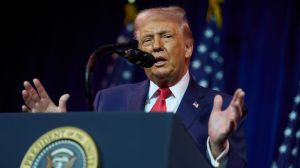The Achkan Arrival
That Muslim menswear has lost its religious tag is a big turnaround in Indian fashion,says Kashmiri designer Zubair Kirmani
That Muslim menswear has lost its religious tag is a big turnaround in Indian fashion,says Kashmiri designer Zubair Kirmani
When was the last time you saw a groom wearing a three-piece suit for his wedding ceremony? Or,the grooms male friends stiff with silken ties and double-breasted jackets? If most meaningful turnarounds in fashion trends must have a definitive departure point,this is it: how achkans,sherwanis and kurta-pyjamas have ousted the Western mens suit from formal,festive and wedding wear in India. Even for wedding receptions,the Western suit or the tuxedo has been substituted by what we term as Indo-Western menswear.
This is also my response even though a bit roundabout when I am asked what Islamic or Muslim menswear really means? What is it indeed except that so-called Muslim menswear achkans and sherwanis have influenced almost everything we know in the name of Indian menswear. Historically,it is a heritage passed down after numerous influences Middle Eastern couture,flowing robes and jackets with an Islamic,Mughal influence,Turkish motifs and such. Period films,from Mughal-e-Azam to Jodhaa Akbar,showcasing royal Islamic menswear have helped strengthen this notion. But lets not underestimate the bandhgala with the Nehru collar,which spawned a consistent global trend and has been interpreted by some of the top bespoke menswear brands in the world. If ever a history of Indian fashion is written,the Nehru jacket will demand a separate chapter. There is also something innately luxurious about the Nehru collar it imbibes sophistication that few separates in menswear can substitute.
Popularity is helping us redefine Indian menswear. Look around and this assortment of sherwanis,achkans,Nehru bandhgalas and kurtas is available almost everywhere. Even the smallest retail stores now stock a variety of kurta sets with stoles for men. So Islamic wear may have had historical connotation but its usage has become contemporary and should be noted as one of the biggest turnarounds in modern mens fashion.
For Eid,though,my drawing board resonates with simplicity and wearability. Since freshly washed and simple garments are most suitable for a day underlined by prayers and rituals,I emphasise on a basic kurta with Pathani salwar. Beyond Eid or religious festivity,I am a big fan of achkans. I have interpreted them in simplified designs for informal wear: in different lengths,easier-to-drape fabrics without sheen or bling but with a thoughtful use of noticeable buttons. A sherwani,on the other hand,can be as formal,ornate,intricate and decorative as you will. Its a no-limits garment. Muslim men dont prefer satin,fine silk or soft fabric. They perceive such fabrics as feminine. I have got this feedback from most regions from where we sell,also from my recently opened store in Kashmir. Keeping it in mind,I do tonal textures and silk blended fabrics with simple buttons.
I feel achkans have become more popular for weddings,even more than sherwanis. Now,entire families want to be dressed in a similar colour palette for a wedding or in clothes inspired by a single design idea and created by one designer. I have experimented with a variety of formal,luxurious fabrics for achkans worn by grooms family members.
I have also observed that wearability is becoming a big priority for Indian men. So the humble kurta-pyjama stands for two interesting polarities. It works for a traditional occasion and,on the other hand,as a holiday or relaxed day wear. If you look at it from a retail perspective,the sale of kurta sets paired with pyjamas,salwars or churidars has gone up. My favourite dressers for these garments bandhgalas,informal but sharply tailored achkans and sherwanis remain Jamp;K chief minister Omar Abdullah,musician AR Rahman and filmmaker Imtiaz Ali. The former two extend their own style to achkans and sherwanis; Abdullah even wears the phiran with panache when he is in Kashmir. Ali,who was also a part of one of my shows in Kolkata,wore the achkan and the kurtas with an elegance that enhanced the garment itself.
Zubair Kirmani owns the label Zubair Kirmani. His flagship store is in Kashmir and he also retails from multi-designer stores in other cities.
- 01
- 02
- 03
- 04
- 05































